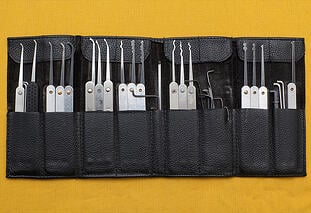AVG BreachGuard
Protect your personal data by removing it from online databases and more
Our data breach software scans the internet for your personal data 24/7, alerting you to potential data leaks or breaches. Plus, stop third parties from collecting your data and get tips on how to protect your personal info.
Smart online privacy support
Automatic data breach alerts
30+ years of expertise
160+ awards and accolades
How do we help keep your data safer?
The number of Social Security Numbers (SSNs) exposed in data breaches and sold on the dark web could now be at over 300 million. Uncover and act on personal data leaks right away, thanks to the help of our simple in-app dashboard. We can also help you secure your personal data by removing it from online databases.

When a website you use gets hacked...

… and hackers post your personal info online...

… we spot the hack and notify you about it.

Plus, we help you take your data offline to protect it.

AVG BreachGuard
Act faster against data breaches, get tips on securing your data
Round-the-clock monitoring
Monitor the web non-stop for your leaked personal info.
Online personal info removal
Keep your online identity safer by removing your data from the internet.
24/7 expert support
Help fix potential data breach issues by contacting our US-based specialist team.
Data leak prevention tips
Get advice on how to make your online accounts more secure and private.

Respond quickly to personal data leakage and more
-
Get automatic data breach alerts when your info is shared on the dark web.
-
Act faster on identity theft and better protect yourself with expert guidance.
-
Scan your accounts to see if your personal info is at risk.
Remove your personal info from the internet
Data brokers collect info about you
based on your online activity, including your finances, health, and even address.
They sell this info to third parties
Insurance companies may use it to raise your rates, banks may refuse you a loan, and more.
BreachGuard stops this happening
by removing your info from data broker databases before it can be sold.

Prevent your info from being exploited with BreachGuard
- See what types of information data brokers are collecting about you.
- Automatically demand that your personal info be removed from data broker databases.
- Monitor data brokers to ensure your info is permanently removed from their databases.
Get 24/7 US-based expert help to address data breach issues
- Help yourself resolve credit freezes with our support and address fraudulent charges.
- Send our US-based team things like questionable emails, websites, texts, and get a security assessment within 24 hours.
- Get help if you lose your wallet, support with contacting the authorities, and assistance with emergency funds, plus more.


Secure your online accounts quickly and easily
- Analyze how secure they are and get useful tips about your privacy settings.
- Assess the strength of your passwords and receive alerts if they’ve been leaked in a data breach.
- Stay informed about new data breaches and take action to keep your info safe.
Avoid advertisers with our browser extension
- Send requests to specific advertisers to stop using your data.
- Automatically opt out from new advertisers as we add them to our list.
- Use on Chrome, Firefox, Edge, Avast Secure Browser, and Opera.

FAQs
What is a data breach?
A data breach is an event in which sensitive information is exposed or compromised. Based on services or websites you’ve used in the past, your personal information is likely stored in hundreds or thousands of databases worldwide. Companies known as data brokers compile and sell personal data to other groups for use in advertising, marketing, and similar fields. While most companies strive to protect the data you trust them with, they’re not always successful.
Once your information has been leaked, it may end up for sale on the dark web, where it can be bought and used to commit identity theft. That’s when a criminal uses your personal information — your name, your financial data, personal identifiers like your social security number, and more — to impersonate you, online or off. On the internet, it generally means using data that’s been stolen from you to make accounts in your name, buy things with your money, and possibly even use your identity to try and scam others.
By requesting that data brokers remove your data from their registries, AVG BreachGuard helps to reduce the chances that your data will be compromised in the event one of these companies suffers a breach.
Where would a thief access my personal information online?
Your personal info exists in three main areas that may compromise your privacy:
- Illegal marketplaces
- Legal marketplaces
- Sign-up services that often abuse their power
These include the dark web, which is where hackers can sell the information they’ve stolen, as well as buy information like credit card numbers from other hackers, putting you at risk of identity theft.
Legal marketplaces
These consist of third-party data brokers and advertising companies that may have collected your sensitive information without your knowledge or consent. Selling your information in these legal marketplaces is perfectly acceptable in the eyes of the law, but most people consider the practice very intrusive.
Sign-up services
Services like Facebook and Google rely on data that you have submitted to them. However, this information is often stored for longer than you may know, or is combined with additional data to form insights about you.
What is the dark web?
The dark web is a section of the deep web (parts of the internet not accessible via search engines) that can only be accessed with the anonymizing Tor browser. Despite its reputation, there is nothing intrinsically bad about the dark web — it’s just an extra-anonymous part of the internet. But that extra anonymity does enable people to do some bad stuff, such as hackers buying and selling personal data that may have been collected illegally in a data breach. Note that data brokers don’t operate on the dark web.
What is a data broker?
A data broker is a company that collects and sells personal information. Generally, they use high-tech methods to track your behavior on websites and applications, and combine that info with profiles they buy about you from other corporations. This can include information about your finances, health, and identifying data such as your address and information about your online activities. Spooky? You bet. Data brokers are everywhere these days (there are thousands of them), as data brokering is a multi-billion dollar industry.
How do I remove my personal data from the internet?
It’s not easy to disappear from the internet. Third-party data brokers and other companies create highly detailed profiles about you based on your web browsing habits and even offline information like in-store credit card purchases. Worse, these companies sell and share this information with other businesses for profit.
To remove your info from the internet, you would have to request that each individual data broker do so. They’re legally obligated to comply, but it’s a time-consuming and complicated process.
Services like Facebook, Google, and Instagram generally permit you to remove your information or enhance your privacy settings, but it can be difficult to find and properly use these features. Unfortunately, if your information is being sold on the dark web, it’s nearly impossible to remove it. This is why preventative security measures are crucial.
How else can I protect against data breaches?
AVG BreachGuard protects your data against breaches by requesting that data brokers remove your personal information from their databases. When fewer companies are storing your data, your chances of being compromised in a breach are lower. Otherwise, there’s very little you can do to prevent a data breach, as you have no control over how securely any given company will store your data.
Data encryption apps and services can keep your data safe on your end and reduce your risk of identity theft. AVG’s Sensitive Data Shield, included with AVG AntiVirus Free, protects files on your home PC to ensure hackers can’t take your data straight from the source.
Otherwise, be selective when signing up for new services and accounts. Consider limiting yourself, where possible, to companies that have a good history of being safe, or have noteworthy security.
If you become a victim of data breach, having a unique password for each of your online accounts can make it more difficult for hackers to access more of your personal information. You can use our random password generator to help create passwords more resistant to hacking or algorithm-based password cracking techniques.
Get privacy and security tips,
straight from the experts










